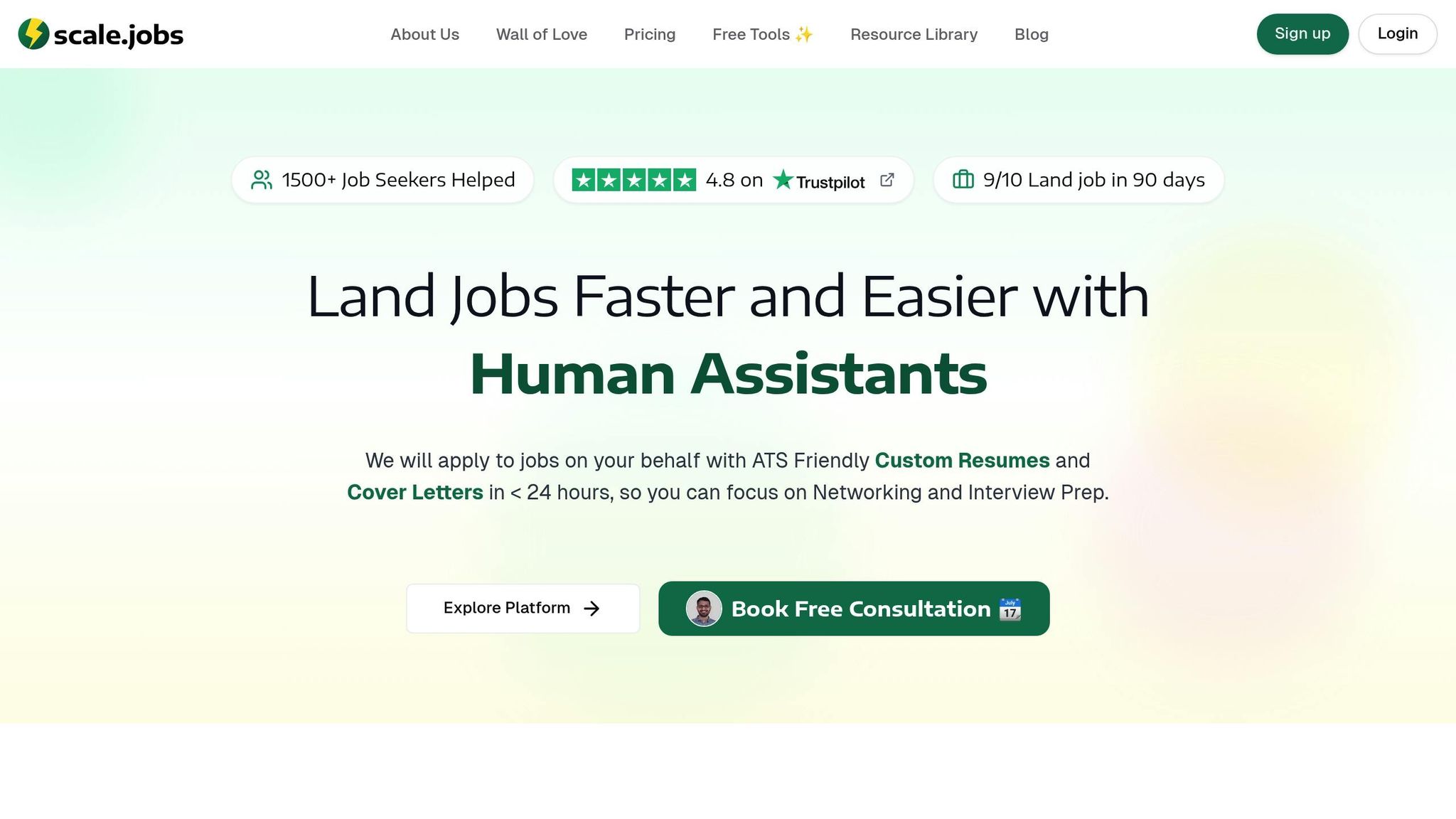How Skills Gap Analysis Boosts Career Growth
Skills gap analysis reveals missing abilities for your target job, creating a roadmap for career growth and improved job prospects.

Want to grow your career faster? Skills gap analysis is the key. It helps you identify the skills you’re missing for your target job and create a clear plan to close those gaps. Here’s why it works:
- Pinpoints gaps: Compare your current skills to the requirements of your ideal role.
- Improves job prospects: Addressing gaps makes you more competitive and confident.
- Boosts performance: Closing skill gaps helps you handle tasks more efficiently.
- Tools like Scale.jobs simplify the process: Use AI and expert support to analyze gaps, improve your resume, and focus on skill-building.
Platforms like Scale.jobs combine free tools, AI insights, and human assistance to help you stand out in the job market while building the skills you need for long-term success.
How Do I Do A Skill Gap Analysis For A New Industry? - Job Success Network
How to Identify Skills Gaps: Methods and Tools
Spotting skill gaps is a crucial first step in advancing your career. Combining honest self-assessment with data-driven tools can help you identify areas for growth. Many career experts suggest blending traditional methods, like self-reflection, with modern technology that provides real-world insights. Let’s break down how both approaches can work together to pinpoint what you need.
Self-Assessment and Feedback
The process starts with self-reflection. Begin by listing your current skills and rating your proficiency on a simple scale. Then, compare this list to the skills mentioned in job descriptions for roles you’re aiming for. This simple exercise often highlights areas where you’re falling short.
But don’t stop there. External feedback can provide a more complete picture. Peer reviews and input from managers can uncover areas you might overlook. A 360-degree feedback process - gathering insights from coworkers, direct reports, and even clients - can be especially revealing. Conversations with mentors in your industry can also shed light on emerging trends and the skills that are becoming increasingly important.
Technology-Based Skills Analysis Tools
While self-assessment is valuable, technology can take it a step further by using data to verify and deepen your understanding of skill gaps. These tools can compare your current abilities to market demands in real time.
For instance, scale.jobs offers a free skills analysis tool that matches your qualifications with a wide range of job postings. It highlights the most frequently required skills and provides a detailed breakdown of your gaps. Unlike some platforms that focus solely on keyword matching, scale.jobs delivers a more thorough analysis.
Other tools, like Jobscan, tend to concentrate on optimizing resumes for applicant tracking systems (ATS) rather than providing a full view of skill development. Similarly, some platforms rely heavily on user input without incorporating broader market data, limiting their effectiveness.
Comparing Skills Gap Analysis Tools
When choosing a platform, it’s important to consider what each tool offers:
- scale.jobs combines AI analysis with human guidance, offering actionable strategies for skill improvement.
- Other platforms often focus narrowly on resume optimization, missing the bigger picture of career development.
- Some tools emphasize automating job applications but don’t address how to build the skills needed for long-term growth.
A balanced approach, like the one offered by scale.jobs, not only identifies gaps but also provides guidance on how to close them. This ensures you’re not just aware of your weaknesses but actively working toward career advancement.
How to Close Skills Gaps for Career Growth
Once you've pinpointed the skills you need to work on, it's time to act. Bridging these gaps calls for a mix of structured learning, hands-on practice, and smart tools that can fast-track your progress. The goal? To not only sharpen your abilities but also to position yourself for immediate career growth.
Training and Certification Programs
Certification programs offer structured, recognized pathways to build expertise. For example, tech professionals often pursue certifications like AWS, Google Cloud, or Microsoft Azure to showcase their cloud computing skills. While these programs may require a financial investment, they help validate your expertise and can open doors to new opportunities.
Online learning platforms such as Coursera, Udemy, and LinkedIn Learning provide flexible options for building skills. Many professionals pair these courses with real-world projects to create portfolios that demonstrate their abilities, making them ready to apply their knowledge in new roles.
Professional bootcamps are another option, offering focused, intensive training in areas like data science, cybersecurity, or digital marketing. Though these programs can be a bigger financial commitment, they often come with job placement assistance and networking opportunities to help you transition into high-demand roles.
Using Platforms for Skill Development
Beyond formal training, digital platforms can streamline your skill-building efforts. Modern tools not only help you learn but also showcase your abilities effectively. One standout example is scale.jobs, which combines skill development with practical application.
- Its AI-powered resume builder identifies gaps based on your target roles and suggests improvements, tailoring your resume to highlight your evolving skills.
- A human assistant service manages your job applications, freeing up your time to focus on learning and networking. This service ensures your skills are presented effectively for each role.
- The platform also offers a real-time feedback system that keeps you informed about the skills employers are actively seeking. This helps you focus on learning what's most relevant for your goals.
While other platforms like Jobscan emphasize keyword optimization, scale.jobs provides a more comprehensive approach by blending AI insights with expert guidance, supporting you throughout your skill-building journey.
Setting SMART Goals for Skill Improvement
To make the most of these tools and programs, it's important to set clear, actionable goals. The SMART framework is a great way to stay on track:
- Specific goals: Be clear about what you want to achieve. For instance, instead of saying, "I want to improve my marketing skills", aim to complete a Google Analytics certification and apply three new tracking strategies in your current role by March 2026.
- Measurable outcomes: Track your progress with quantifiable targets. If you're developing leadership skills, you might aim to lead two cross-functional projects and collect feedback from your team.
- Achievable timelines: Set realistic deadlines that push you without overwhelming you. For example, learning a programming language might take several months of consistent practice rather than a rushed timeline.
- Relevant skills: Focus on skills that align with your career goals and market demand. Research job postings in your field to confirm you're targeting the right competencies. Tools like scale.jobs can also highlight which skills are most sought after in your desired roles.
- Time-bound milestones: Break big goals into smaller steps. For example, if you're learning data analysis, you could aim to complete an advanced Excel course by January 31, finish SQL fundamentals by February 28, and build your first dashboard by March 31.
Professionals who regularly update their goals based on industry trends are better equipped to stay ahead in their careers. By combining clear planning with the right resources, you can close skill gaps and take meaningful steps toward your career aspirations.
How Skills Gap Analysis Improves Career Growth
Skills gap analysis offers more than just a roadmap for learning - it can reshape your entire professional journey. By identifying and addressing the areas where your skills need improvement, you can enhance your job prospects, boost workplace performance, and build a stronger foundation for long-term career success.
Better Job Prospects and Marketability
Filling in skill gaps can make your resume stand out in a crowded job market. Employers are drawn to candidates who clearly demonstrate the technical and soft skills they need, transforming a standard resume into a tailored showcase of your abilities.
It’s not just about getting noticed on paper, though. A thorough skills gap analysis can also improve your interview performance. By understanding what employers value most, you’ll be better prepared to discuss your qualifications, answer technical questions, and share real-world examples of how you’ve applied key skills. This preparation can lead to more compelling interviews and stronger job offers.
Closing skill gaps can also open doors to higher-paying roles. Many professionals find that gaining in-demand skills qualifies them for positions with significantly better compensation - often making the cost of additional training a worthwhile investment.
Moreover, transferable skills can expand your career options across industries. For example, mastering data analysis could allow you to move between fields like marketing, finance, healthcare, or technology, giving you the flexibility to explore diverse opportunities.
These advantages don’t just make you more marketable - they also build your confidence and improve your overall job performance.
Higher Confidence and Job Performance
When you address skill gaps, you equip yourself to handle workplace responsibilities with ease, reducing stress and boosting confidence. Many professionals report feeling more at ease in team meetings, tackling deadlines with less anxiety, and approaching performance reviews with greater assurance after closing their skill gaps.
Improving technical know-how and critical thinking skills enhances your ability to solve problems and take on leadership roles. This often positions you as the go-to person for tackling challenges, helping you build a reputation for resourcefulness and creativity. Managers also tend to notice employees who can bridge skill gaps within their teams, opening up opportunities for career advancement.
Greater efficiency and competence can even improve your work-life balance. Tasks that once seemed time-consuming become quicker and easier to manage, freeing up time and reducing the need for overtime.
With these benefits in mind, tools like scale.jobs can help you take your career growth to the next level.
Why scale.jobs Beats Competitors for Skills Gap Analysis

Scale.jobs takes skills gap analysis to the next level by combining insightful tools with human support to help you advance your career. Unlike other platforms that simply point out gaps and leave you to navigate the job application maze alone, scale.jobs pairs these insights with a complete job search strategy. This approach not only identifies areas for improvement but also ensures you present your growing skill set effectively.
Key Features of scale.jobs
What sets scale.jobs apart is its three-layer approach: free software tools, AI-powered customization, and dedicated human assistant services.
- Free Tools: Includes an ATS-compliant resume builder and job application tracker that allow you to monitor your skill development over time.
- AI Assistant Pro: For $9/month (launch price, later $19/month), this feature generates personalized resumes and cover letters tailored to each job. It even highlights relevant coursework or transferable skills to address gaps, such as in project management.
- Human Assistant Service: This premium offering handles everything - from creating ATS-optimized resumes and writing customized cover letters to submitting applications across various job platforms. You’ll also receive real-time WhatsApp updates with time-stamped screenshots, giving you full visibility into how your skills and experiences are being showcased. Plus, its flat-fee model avoids recurring subscriptions, freeing up resources for skill-building.
scale.jobs vs Competitors Comparison
Here’s a breakdown of how scale.jobs stacks up against its competitors:
| Feature | scale.jobs | FindMyProfession | LazyApply | Simplify.jobs |
|---|---|---|---|---|
| Human-powered applications | ✅ Trained virtual assistants manage each application | ✅ Reverse recruiting service | ❌ Primarily automated | ❌ Primarily automated |
| ATS optimization | ✅ Custom resume tailored per job | ✅ Resume optimization | ❌ Generic applications | ✅ Basic ATS scanning |
| Real-time updates | ✅ WhatsApp updates with screenshots | ✅ Email updates | ❌ Dashboard only | ✅ Email notifications |
| Skills gap support | ✅ AI and human optimization to address gaps | ✅ Resume consultation | ❌ None | ✅ Basic keyword matching |
While some competitors, like FindMyProfession, offer strong human support, their services often come with a higher price tag, making them less accessible for recent graduates or those impacted by layoffs. On the other hand, platforms like LazyApply and Simplify.jobs rely heavily on automation, which can result in generic applications that don’t effectively highlight your evolving skills. Scale.jobs strikes the perfect balance between affordability, customization, and personalized support.
Why scale.jobs is the Best Choice
Scale.jobs turns skills gap analysis into a practical tool for career growth. Its suite of tools makes it easy to track opportunities and craft resumes that showcase your progress. The AI-powered features ensure every application is tailored to employer expectations, while the human assistants provide the strategic insight that automated systems simply can’t deliver.
Transparency is a standout feature. The real-time updates, complete with proof-of-work screenshots, let you see exactly how your skills are being presented to employers. This feedback loop helps refine your approach and ensures your applications are always improving.
For those dealing with challenges like visa requirements, scale.jobs offers expert support to ensure your skills are showcased in a way that meets ATS standards and industry demands. Additionally, by saving over 20 hours a week on repetitive tasks like applications, you can focus on networking, interview prep, or acquiring new skills - making it a smart, time-saving investment for anyone looking to close their skills gap and advance their career.
Take Control of Your Career with Skills Gap Analysis
A skills gap analysis is your roadmap to building the abilities that employers are actively seeking. By pinpointing the areas where your skills fall short of market demands, you can focus on developing the expertise that hiring managers value most.
This approach is beneficial for everyone - whether you're a recent graduate stepping into the competitive job market, a professional navigating career transitions, or someone facing challenges like layoffs or visa issues. Recognizing and addressing your skill gaps can give you a powerful edge.
It's not just about identifying gaps in areas like project management or data analysis; it's about taking meaningful steps to close them. Strengthening these skills can significantly boost your career prospects and help you stand out in a crowded job market.
Platforms like Scale.jobs make this process easier. They offer free ATS tools, AI-driven resume optimization, and human-assisted application services that can save you over 20 hours each week. Their flat-fee model allows you to redirect those savings into skill-building courses, ensuring you're continually improving without worrying about recurring subscription costs. With these tools, every job application becomes a chance to showcase your progress.
Start today. Use Scale.jobs' free tools to evaluate your current position, and take advantage of their resources to turn your skill-building efforts into tangible career growth. The time you invest in improving your skills now will pay off in the form of long-term career success.
FAQs
How can a skills gap analysis help me advance in my career?
A skills gap analysis is a way to identify the exact skills you need but currently lack for the role or career path you’re aiming for. By zeroing in on these areas, you can prioritize your development efforts, making yourself more prepared and competitive in the job market.
Actively working to bridge these gaps doesn’t just enhance your qualifications - it also builds your confidence and equips you for future opportunities. This focused strategy helps ensure your growth aligns with the skills employers are actively seeking.
How can I assess my skills to identify gaps and boost my career growth?
Conducting a self-assessment to spot gaps in your skills is a key move for career growth. Begin by outlining the main skills needed for the role or career path you’re aiming for. Then, compare these with your current abilities to identify where you might need improvement.
It’s also helpful to get input from trusted colleagues, mentors, or supervisors. Their feedback can offer a different perspective on your strengths and areas to work on. If you’re looking for more structured insights, online tools like resume analyzers or skills assessment tests can be incredibly useful. For example, platforms like scale.jobs provide free resources, including an ATS-friendly resume builder and tools that give actionable feedback to help you align your skills with market demands.
By understanding and addressing these gaps, you can focus your efforts on building the right skills, ultimately positioning yourself as a stronger candidate for future opportunities.
How does scale.jobs help me identify and address skills gaps to improve my job applications?
Scale.jobs takes a different approach by blending human expertise with cutting-edge tools to help bridge skills gaps and refine your job applications. Unlike services like Find My Profession or LazyApply, which lean heavily on AI or require subscription commitments, Scale.jobs offers a one-time payment model for its human-driven services. With trained assistants at the helm, they deliver personalized support, crafting ATS-friendly resumes and customized cover letters that align perfectly with job requirements.
What sets Scale.jobs apart even further are its dedicated WhatsApp updates and proof-of-work transparency, giving you real-time updates and clear visibility into your job search progress. By combining smart technology with hands-on human assistance, Scale.jobs creates a smoother, more efficient, and less stressful job application experience.




